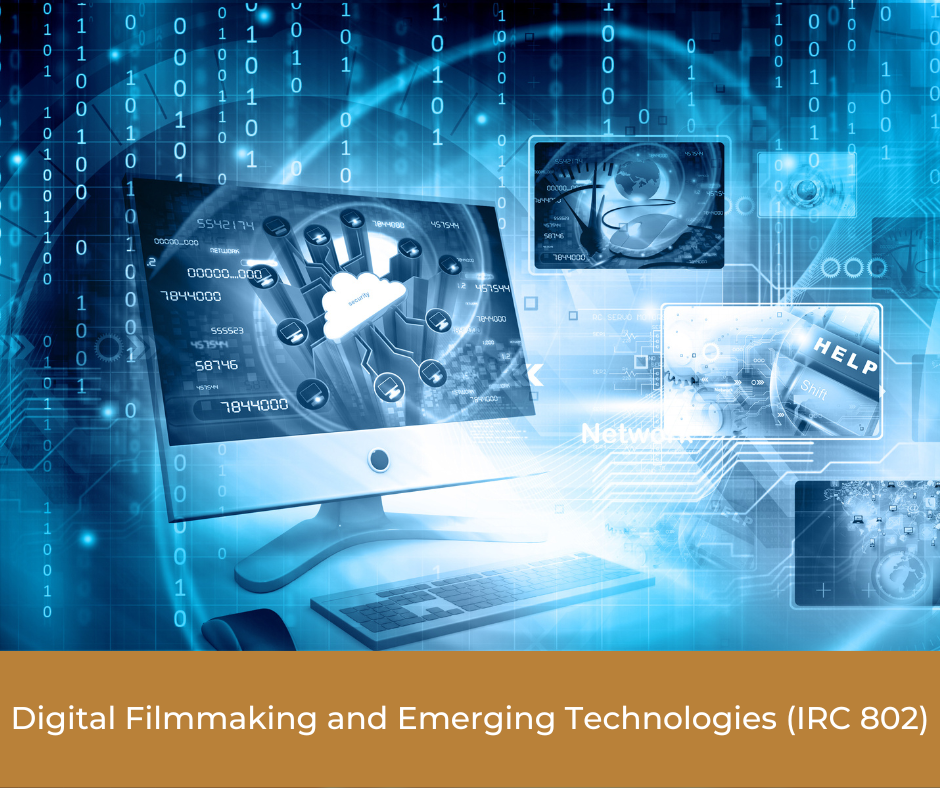Course Description: This advanced course explores the latest innovations in digital filmmaking, focusing on the integration of emerging technologies. Students will gain hands-on experience with high-resolution cinematography, virtual production, and interactive storytelling, equipping them to create cutting-edge digital films that push the boundaries of traditional filmmaking. The course provides a comprehensive understanding of the digital filmmaking landscape, allowing students to harness technology to tell compelling stories in an evolving media landscape.
Outline of Major Content Areas:
- Digital Cinematography and Color Grading:
- High-resolution filming techniques
- Advanced camera equipment and technology
- Cinematic composition and visual storytelling
- Digital color correction and grading
- Virtual Production and CGI (Computer-Generated Imagery):
- Introduction to virtual production
- Real-time rendering and previsualization
- Implementing CGI in digital filmmaking
- Digital set design and integration
- 360-Degree Filmmaking and VR (Virtual Reality):
- Capturing and editing 360-degree content
- Immersive storytelling in VR
- VR hardware and software
- Combining VR with traditional storytelling
- Interactive and Transmedia Storytelling:
- Narrative structures in interactive media
- Developing interactive and transmedia projects
- User experience (UX) and audience engagement
- Case studies in interactive storytelling
- Practical Projects:
- Digital Filmmaking Project: Students will create digital films that incorporate advanced cinematography techniques and color grading.
- Virtual Production Project: Students will develop projects that involve real-time rendering, previsualization, and the integration of CGI.
- VR Filmmaking Project: Students will produce immersive VR content, combining 360-degree filming with interactive storytelling elements.
- Interactive Storytelling Project: Students will design and create interactive or transmedia narratives that engage with various emerging technologies.
Course Learning Outcomes:
Upon successful completion of this course, students will be able to:
- Demonstrate proficiency in advanced digital cinematography techniques, including high-resolution filming, camera technology, and cinematic composition.
- Employ digital color correction and grading to enhance the visual aesthetics and storytelling in digital films.
- Understand the principles and applications of virtual production, including real-time rendering, previsualization, and CGI integration.
- Create immersive 360-degree content for VR, using specialized hardware and software.
- Develop and produce VR content that combines 360-degree filmmaking with interactive storytelling elements.
- Design and create interactive and transmedia narratives, considering narrative structures and user experience (UX) in emerging media.
- Apply emerging technologies to digital filmmaking projects, pushing the boundaries of traditional storytelling and engaging with evolving audience expectations.
Methods for Assessing Student Learning:
Assessment in this course will involve a combination of the following methods:
- Filmmaking Projects: Students will complete a series of practical filmmaking projects, such as digital filmmaking, virtual production, VR content creation, and interactive storytelling projects. Evaluation will consider the technical execution and narrative quality of these projects.
- In-Class Exercises: Students will participate in hands-on exercises that demonstrate their proficiency in various aspects of digital filmmaking and emerging technologies.
- Assignments and Reports: Assignments and written reports will assess students’ understanding of course content, including principles of digital cinematography, color grading, and the use of emerging technologies in filmmaking.
- Presentations: Students will present their project work to the class, explaining their creative and technical decisions and engaging in critical discussions about their films.
- Participation and Engagement: Active participation in discussions, peer reviews, and collaborative activities will contribute to the assessment of students’ involvement and knowledge sharing in the course.
Assessment will be designed to encourage creative exploration, technical proficiency, and critical thinking while utilizing emerging technologies in digital filmmaking. Students will have the opportunity to create innovative digital films and explore new storytelling possibilities in the digital media landscape.
